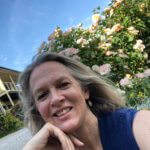‘Enter Ed Federman again…He was so impressed with the calibre of our HNSA authors and conference programs that he approached us with the idea of ARA Group establishing a substantial literary prize dedicated to historical fiction with prize money of $30,000! Once I picked myself up from the floor, I said, ‘Yes, please!’”

Tomorrow, 30th June 2020, at 5pm AEST precisely, the opportunity to enter the inaugural ARA Historical Novel Prize will come to a close. No doubt many historical novel fans will be excited to contemplate what this may augur for the future of historical fiction in Australasia. To round off this series of ‘What historical fiction means to me’ interviews, HNSA Chair, Elisabeth Storrs, shares why historical fiction means so much to her. For those of us not there at the inception of the HNSA, she also looks back on its first steps, reflects upon how it has grown, and reveals how the organisation was fortunate enough to attract a patron sufficiently generous and enthusiastic about historical novels to sponsor such a groundbreaking, major Australian literary prize.
In your experience as Chair of the HNSA what do you think is the particular appeal of historical fiction?
Escape and enlightenment. As an author, I can’t wait to sit at my computer and escape from the dramas of everyday life into an imaginary world built on a scaffold of history I’ve researched. As a reader, I love an historical novel that sweeps me into an authentic vision of an era that shows me politics, power plays, and passions at the same time as details as to manners, dress, and customs. Historical fiction frees you to forget your 21st century life and immerse yourself in any time period you choose. To say it’s time travel is a cliché but the ability to open a book and immediately lose yourself in history holds a powerful attraction.
What hopes and aspirations did you have for the HNSA when it was first formed, and how has it developed in the intervening years?
HNSA started from very humble beginnings in 2012 when I co-founded a Facebook group and blog to provide a forum for fellow historical fiction fans. I was soon joined by a small group of volunteers keen to hold a conference featuring ANZ novelists. This was with the encouragement of Richard Lee, founder of the Historical Novel Society in the UK, who was eager to establish a third international event. With the Facebook group growing to over 500 people by 2015, our committee felt confident enough to underwrite the costs of a one stream conference at Balmain Town Hall with the help of HNS. We all held our breaths that we could sell enough tickets! To our delight, the event was hugely successful due to the enthusiasm of both the participating authors and the attendees. More importantly, we saw the birth of a community of historical fiction aficionados who were able to meet and share their enthusiasm for history and writing. At last I could physically meet the people I’d connected with in the virtual world over the years. It still delights me to see familiar faces returning each conference. The loveliest feedback is how friendly our events are. My theory is that you can always strike up a conversation by asking ‘what period of history do you love?’
HNSA has now held two more biennial conferences. As a point of difference from other genre-based conferences, we decided to work with universities to incorporate an academic stream into our programming. This led to partnerships with Swinburne University of Technology in 2017, and Western Sydney University in 2019. Each conference has grown progressively larger with HNSA 2019 featuring over 80 speakers across two streams and an academic symposium. We also introduced a full day Craft & Publishing workshop program in the atmospheric Old Female Orphan School at Parramatta.
With the success of our conferences, the committee has been able to extend its goal of fostering historical fiction through our various contests, commencing with the signature First Pages Pitch Contest and the ARA Short Story Prize. In 2019, the HNSA Colleen McCullough Residency was introduced. This provided an opportunity for an aspiring and an established author to stay for one week on Norfolk Island, thanks to our generous sponsors, Burnt Pine Travel and Baunti Escapes. We also plan to provide a mentorship for an unpublished writer of young adult historical fiction in the very near future (stay tuned!).
Another accomplishment of which I’m proud is our podcast Imagining the Past which spotlighted various participating speakers from the last two conferences. I’m pleased to say we will soon be launching a new set of episodes featuring recordings of sessions at HNSA 2019, so people who missed out last year will be able to enjoy catching up with our program.
Please tell us a little bit about the HNSA’s relationship with the ARA Group and how the ARA Historical Novel Prize came into being.
Ed Federman, ARA Group Founder, Executive Chair and Managing Director, has been a great friend of HNSA for over 5 years, providing sponsorship money in 2017 and 2019 that allowed us to pay our speakers industry rates. ARA Group’s funding also enabled us to establish the First Nations Participation Fund thereby ensuring we could pay the travel and accommodation expenses of Indigenous speakers. ARA Group also sponsors the ARA HNSA Short Story Prize .
Ed is a true philanthropist with a long-standing involvement in fostering the arts in Australia through the ARA Group which is Principal Partner of Sydney Writers Festival, the Monkey Baa Theatre, and the National Institute of Dramatic Arts. Ed also has a personal passion for rewarding and recognising excellence in writing, preserving the past through historical literature, and enriching people’s lives by advocating for proficient literacy among all Australians. In short – Ed is a great lover of historical fiction and believes in supporting us to make a noise about it!
As for the inception of the prize, it was a case of serendipity. The committee had considered the introduction of a prize in association with New England Writers’ Centre but placed the idea into the ‘too hard’ basket. Enter Ed Federman from ARA Group again. He shared our vision to place historical fiction ‘on the map’ in the ANZ literary scene. He was so impressed with the calibre of our HNSA authors and conference programs that he approached us with the idea of ARA Group establishing a substantial literary prize dedicated to historical fiction with prize money of $30,000! Once I picked myself up from the floor, I said, ‘Yes, please!’ HNSA is delighted to have inspired his confidence to introduce and administer a major literary prize giving ANZ historical novelists the chance to be recognised in a class of their own, with the most significant prize money for any genre-based prize in Australia
How do you think a prize such as the ARA Historical Novel Prize helps to raise the profile of historical fiction in Australasia?
Historical fiction has often been dismissed as having less gravitas despite the fact literary prizes, such as the Booker and Miles Franklin, have been awarded to novelists whose books undoubtedly fall within the genre and yet are classed as ‘literary’ rather than historical. The great Hilary Mantel stands on the brink of making her own history by winning the Booker three times in a row (she currently stands in a class of her own with Peter Carey as holding the title twice). Prize winning Australian historical novels over the years have included Schindler’s Ark, The Narrow Road to the Deep North, That Deadman Dance, The Secret River, Oscar and Lucinda, March, All that I Am, The Great Fire, The True History of the Kelly Gang, Cloud Street, and The Ballad of Desmond Kale. And those which have captured the hearts of readers with both critical acclaim and commercial success include Burial Rites, Year of Wonders, The Book Thief, The Power of One, An Imaginary Life and The Thorn Birds (one of the highest selling novels in the world). Stella Miles Franklin herself wrote an historical novel, All That Swagger. And our greatest novelist, Nobel Prize winner, Patrick White, brought us the masterpiece, Voss, as well as Fringe of Leaves. I could go on and on.
HNSA hopes that the ARA Historical Novel Prize will ensure an author is proud to call their novel ‘historical fiction’ due to its literary merit, depth of research, and reader appeal. We are also hopeful booksellers begin categorising the genre on separate shelves rather than class books as ‘general fiction’. Providing the opportunity for an author to obtain an accolade for writing historical fiction might also encourage publishers to recognise the value of further fostering the genre on a grander scale.
Why do you feel it was important to include such abroad selection of sub-genres of historical fiction? Do you have a personal favourite and if so, why do you feel it is important?
The definition of historical fiction laid down in the contest rules is based on the one set out by the Historical Novel Society in the UK. We believed it was important to specify various sub-genres to ensure as many novelists as possible would be encouraged to enter. In many ways, the categories are irrelevant to me in terms of judging a book. The winning novel will stand out because of exceptional writing and the creation of an authentic historical world whether it’s a mystery, love story, fantasy, and/or written for a younger audience (or a combination of all these things).
What do you think makes a standout historical novel?
An exceptional historical novel is one where the author invites the reader to recognise relationships and human nature (in all its many manifestations) are constant across eras, while also highlighting differences by way of historical context. What I call a merging of ‘unfamiliar and familiar pasts’. The best historical fiction is immediate and vivid without research showing through to the detriment of pace and narrative flow. Finally it’s a book that can both quench your thirst for knowledge yet leave you hungering for more.
More about Elisabeth
Elisabeth Storrs has a great love for the history and legends of the ancient world. The Wedding Shroud was endorsed by Ursula Le Guin, and named by Ben Kane as one of the top three books set in the classical world. Call to Juno was an Editor’s Choice in the Historical Novels Review. An archaeologist loved her A Tale of Ancient Rome saga so much she created an audio-visual exhibition featuring Elisabeth’s characters voicing votive statuary at the Museo dell’Agro Veientano near Rome. Elisabeth is the founder and Chair of the Historical Novel Society Australasia, former Deputy Chair of Writing NSW, and one of The History Girls.

The ARA Historical Novel Prize, for published historical novels by Australian and New Zealand authors, will be worth $30,000 to the winning author. With entries opening on May 1, it is a partnership between generous sponsor, the ARA Group, and the Historical Novel Society Australasia (HNSA), in association with the New England Writers’ Centre. HNSA is delighted and proud to introduce this initiative, which celebrates the diversity and strength of an increasingly popular and acclaimed genre.

This interview was compiled by HNSA Marketing Coordinator, Lou Greene. Lou was winner of the HNSA First Pages Pitch in 2017 and she long-listed in the Richell Awards. Last year, as well as being short-listed in the HNSA short story competition, she was a recipient of an ASA Mentorship Award. Lou has an MA Modern History and has recently completed a dual timeline, novel manuscript. Find out more about Lou’s writing from her website, or connect with her via Instagram or Twitter.




